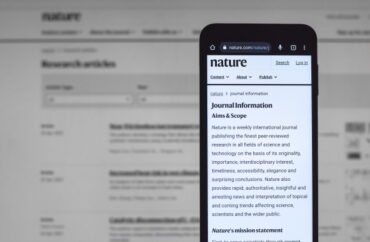
A climate scientist has outed two of the nation’s top science journals for what he contends is their bias for publishing papers that support the narrative that human activity is the primary cause of extreme climate change while ignoring other factors.
Patrick Brown, co-director of the Climate and Energy Team at the Breakthrough Institute and a lecturer in the Energy Policy and Climate Program at Johns Hopkins University, wrote that editors of journals like Nature and Science actively work to publish research that fits a certain narrative.
To get published, Brown wrote in The Free Press, researchers must produce findings “that the effects of climate change are both pervasive and catastrophic and that the primary way to deal with them is not by employing practical adaptation measures like stronger, more resilient infrastructure, better zoning and building codes … or in the case of wildfires, better forest management or undergrounding power lines—but through policies like the Inflation Reduction Act, aimed at reducing greenhouse gas emissions.”
Brown said he knows this, because that’s exactly what he did to get his paper “Climate warming increases extreme daily wildfire growth risk in California” published in Nature recently. He is its lead author.
His Sept. 5 piece in The Free Press is headlined “I left out the full truth to get my climate change paper published,” with a subhead: “I just got published in Nature because I stuck to a narrative I knew the editors would like. That’s not the way science should work.”
Brown wrote:
In my paper, we didn’t bother to study the influence of these other obviously relevant factors. Did I know that including them would make for a more realistic and useful analysis? I did. But I also knew that it would detract from the clean narrative centered on the negative impact of climate change and thus decrease the odds that the paper would pass muster with Nature’s editors and reviewers.
This type of framing, with the influence of climate change unrealistically considered in isolation, is the norm for high-profile research papers. For example, in another recent influential Nature paper, scientists calculated that the two largest climate change impacts on society are deaths related to extreme heat and damage to agriculture. However, the authors never mention that climate change is not the dominant driver for either one of these impacts: heat-related deaths have been declining, and crop yields have been increasing for decades despite climate change. To acknowledge this would imply that the world has succeeded in some areas despite climate change—which, the thinking goes, would undermine the motivation for emissions reductions.
Brown goes on to note that another trick journal editors like is when researchers play with the parameters to showcase the biggest, most eye-popping numbers.
“Our paper, for instance, could have focused on a simple, intuitive metric like the number of additional acres that burned or the increase in intensity of wildfires because of climate change. Instead, we followed the common practice of looking at the change in risk of an extreme event—in our case, the increased risk of wildfires burning more than 10,000 acres in a single day,” Brown wrote.
Last week, I described our paper on climate change and wildfires:https://t.co/dm1hRsdQ7a
I am very proud of this research overall. But I want to talk about how molding research presentations for high-profile journals can reduce its usefulness & actually mislead the public.
— Patrick T. Brown (@PatrickTBrown31) September 5, 2023
While the climate scientist also stated his research and article is sound, he lamented what it took to get it published in the most high-profile publication available.
Ultimately, Brown argued, the practice is bad for good science.
“I left academia over a year ago, partially because I felt the pressures put on academic scientists caused too much of the research to be distorted. Now, as a member of a private nonprofit research center, The Breakthrough Institute, I feel much less pressure to mold my research to the preferences of prominent journal editors and the rest of the field,” he wrote.
“…But climate scientists shouldn’t have to exile themselves from academia to publish the most useful versions of their research. We need a culture change across academia and elite media that allows for a much broader conversation on societal resilience to climate.”
And on his personal blog, Brown pointed out that the situation is important because “editors at Nature and Science serve as gatekeepers for career success in academic research” and “their preferences exert a major influence on the collective output of entire fields.”
MORE: ‘Evidence’ group discredits study claiming little regret over gender-affirming top surgeries
IMAGE: SSI 77 / Shutterstock




Please join the conversation about our stories on Facebook, Twitter, Instagram, Reddit, MeWe, Rumble, Gab, Minds and Gettr.